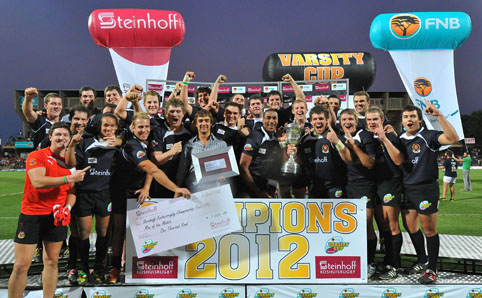Latest News Archive
Please select Category, Year, and then Month to display items
02 January 2025
|
Story Gerda-Marie van Rooyen
|
Photo Supplied
 Leading the research in South Africa is Prof Linus Franke from the Department of Soil, Crop and Climate Sciences.
Leading the research in South Africa is Prof Linus Franke from the Department of Soil, Crop and Climate Sciences.
Scientists are actively pursuing the successful breeding of diploid hybrid potatoes from inbred lines. This is expected to revolutionise potato breeding as it holds the key to rapid genetic progress. It will introduce new varieties for commercialisation through seed. Currently, existing potato variants have a gene that renders self-pollinated seeds infertile.
Prof Linus Franke, an academic in the Department of Soil, Crop and Climate Sciences at the UFS, is leading the research in South Africa. “This technology allows the production of genetically uniform potato seed that is easy to transport and largely disease-free.” He says this differs from conventional breeding whereby only vegetative propagation is possible due to tetraploid varieties in potatoes. It also risks carrying pests and diseases from one generation to the next – leading to the accumulation of pests and diseases with each round of multiplication.
Seed innovation
Prof Franke explains that Solynta BV, a seed company based in the Netherlands that produces potato varieties that can be grown from seed, has included South Africa in their research efforts because it is one of Africa’s largest producers and exporters. Through his academic relationship with Wageningen University and Research, a Dutch institution renowned for its agricultural endeavours and food production, the UFS became involved in researching hybrid potatoes grown from seed.
Diploid seeds containing two sets of chromosomes allow easier gene manipulation to increase predictability and speedier genetic progress. The breeding approach enables the incorporation of tolerance to pests, diseases, abiotic stresses (cold, heat, drought) and other desired genetic traits.
Although Prof Franke is optimistic about this research, he is not blind to disadvantages. “Potato seeds are tiny and have little energy reserves, making it harder to grow potatoes from seed than from tubers.” He says potatoes from seed will take longer to cultivate than tubers, as farmers need to grow plantlets from seeds first, adding six weeks to the growing period. “It is possible that commercial farmers can grow potatoes directly from seed. Alternatively, perhaps more likely, specialised growers will produce tubers of potatoes from seed; these tubers are then sold as seed tubers to other potato farmers, who then continue their normal practices of producing potatoes for the market from tubers.”
Financial benefits
Prof Franke says farmers have reason to get excited. “Seed potatoes will reduce input costs, as varieties with enhanced tolerance to pests and diseases require less pesticides. Planting one hectare of potatoes requires three to four tonnes of potato tubers, but only one 25 g packet of potato seeds.” Since potatoes are a more valuable commodity than maize, this technology might also increase farmers’ income potential.
Vishuis the best Koshuisrugby team in the country
2012-04-11
 |
|
Photo: Varsity Cup
11 April 2012
|
The best in koshuis rugby. That is the title Vishuis Residence rugby team can use with pride. Vishuis gave Stellenbosch University’s Dagbreek Residence a drubbing with a 44-26 win. They clinched the 2012 Steinhoff Koshuisrugby Championships title on Monday 9 April 2012 at the Tuks Rugby Stadium in Pretoria.
It is the second time that Vishuis has won the tournament. Kovsies now has three Steinhoff Koshuisrugby Championship titles. Armentum won the title in 2009 and Vishuis won its first title in 2010.
Vishuis went into finals unbeaten, whipping residences from the University of Pretoria (Tuks) and Tshwane University of Technology (TUT) on their way to victory. The Kovsie students beat Steinhoff Mopanie from Tuks 26-18 in a round three match and thrashed TUT’s Steinhoff Monitor 133-13 in a round five match. The Vishuis team beat Steinhoff Dagbreek 15-14 in their first match of the tournament. The Kovsies played five matches in total.
Vishuis team manager and fellow-coach, Gerhard Meyer, said it was only the third time that his team had participated in the tournament. Meyer, who played in the Vishuis team that won the tournament in 2010, said winning the Championship as player and fellow-coach was a personal highlight. “Taking it step by step, the hard work of the boys has been rewarded.”